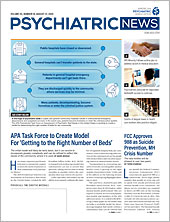As members of the APA/APAF Minority Fellowship Program, we come together as a collective to stand in solidarity to condemn racism. We are all resident physicians who, through the support of APA and the APA Foundation (APAF), are working to alleviate health disparities in marginalized populations through various projects and advocacy work. We therefore believe it is paramount for us to enter the current conversation happening within our country on racism, with a specific focus on medical education, an area that we are uniquely positioned and qualified to discuss.
Police brutalities against Black people are not simply unfortunate acts carried out by “a few bad apples,” but rather the sequelae of systemic racism. We hope to highlight the reality that these racist underpinnings are not only pervasive in police institutions and the criminal justice system, but also in health care, education, and their intersections in various forms leading to innumerable health care disparities.
Many health care institutions and medical schools, including the AMA, have released statements condemning police brutality and racism. However, such statements ring hollow without action. As human beings, we should all strive for equity and equality and must not be complicit or tolerant of the harms that systemic racism causes. As physicians, our obligation is to address systemic racism that not only affects the health of populations that we serve, but also infringes on the dignities of those who live and work in these health care systems.
As leaders in undergraduate and graduate medical education, our duty is to ensure that future physicians lead in anti-racist work and are aware of the biases that can affect their care to individuals.
We believe that one of the first steps in combating systemic racism in the medical field is addressing issues within our training institutions. For this reason, we have come together as a group of resident physicians to create a list of tangible actions that we believe may help dismantle racial inequalities within medical education.
Action items:
1.
We support the creation of networks and communities that encourage open discussion for minority and marginalized providers.
2.
We support the recruitment and retention of a diverse workforce through inclusion initiatives that are adequately funded, appropriately staffed, and well integrated.
3.
We support intentional mentorship and sponsorship of trainees of color into leadership positions.
4.
We support continued training for health care providers on how to productively address racist or biased behaviors as they occur in health care and educational settings.
5.
We support educational research and scholarship that focuses on identifying best practices on training in implicit bias, structural racism, and cultural humility.
6.
We support increased resources including financial and protected time for research and academic endeavors around race, culture, and socioeconomic disparities.
7.
We support review of the current medical curricula, didactic and clinical based, with the goal of better understanding how racist ideas are embedded within and using that obtained knowledge to make the needed changes.
8.
We support increased use of holistic review processes by medical training institutions, including the further de-emphasis of standardized testing such as the MCAT and USMLE.
9.
We support increased awareness and evaluation of racial/ethnic disparities in certain academic awards, such as the Alpha Omega Alpha Honor Medical Society, with appropriate changes or removals of these items.
10.
We support institutional systems for reporting incidents that negatively impact individuals from minority or underrepresented groups. Aggregate anonymous data from these systems should be used to help analyze, identify, and address systemic needs.
11.
We support increased training opportunities in diverse and socioeconomically disadvantaged areas. We recommend the utilization of innovative technologies and systems to aid in this endeavor.
We believe that the implementation of these items will begin to dismantle the current racist underpinnings within our education, help to improve treatment and experiences of people of color in medicine, and consequently work to better the treatment of all patients. ■
The views expressed in this article are those of the individual fellows and not of APA or SAMHSA.
